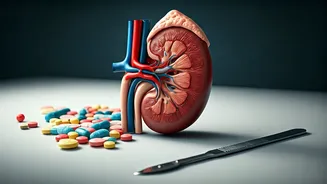Risky Habits Unveiled
A heart surgeon has pinpointed five everyday habits that can be particularly detrimental to kidney health. These habits, often overlooked, can contribute
to kidney damage and impair overall well-being. This information highlights the significance of understanding these risks and making necessary adjustments to protect your kidneys. The following sections will break down each habit, elucidating its impact on the kidneys and discussing strategies to mitigate potential harm. The aim is to empower readers with the knowledge they need to make informed choices and safeguard their kidney function for the future. By embracing these preventative measures, individuals can take proactive steps towards maintaining optimal health and avoiding the pitfalls of these common, yet dangerous, habits. This approach underscores the importance of a healthy lifestyle and the impact of our everyday choices on our vital organs.
High Sodium Intake
Excessive sodium consumption is one of the most perilous habits for kidney health, the heart surgeon warns. The kidneys play a critical role in regulating sodium balance in the body. When sodium intake is high, the kidneys must work harder to filter and eliminate the excess. This increased workload can lead to hypertension and potentially damage the delicate structures within the kidneys over time. Regularly consuming processed foods, fast foods, and salty snacks significantly elevates sodium intake. These items frequently contain hidden sodium, making it difficult to monitor intake accurately. To protect your kidneys, be mindful of sodium content on food labels, and prepare meals at home with fresh ingredients. Aim to limit processed foods and add less salt when cooking. Using herbs and spices to enhance flavor is a healthy alternative. Careful attention to diet is a simple yet effective measure for kidney protection.
Insufficient Hydration
Not drinking enough water is another serious threat to kidney health. Adequate hydration is essential for the kidneys to perform their functions effectively. Water helps the kidneys flush out waste products and maintain overall kidney health. Chronic dehydration can reduce blood flow to the kidneys, potentially causing damage and increasing the risk of kidney stones. Dehydration also concentrates urine, making it more difficult for the kidneys to function properly and remove waste. Symptoms of inadequate fluid intake may include dark-colored urine, infrequent urination, and fatigue. To ensure proper kidney function, aim to drink enough water throughout the day. The amount required varies based on activity level and climate, but a general guideline is to drink at least eight glasses of water daily. Keep a water bottle handy and sip throughout the day to stay well-hydrated. Monitoring your urine color, which should be pale yellow, is a good indicator of hydration status.
Overuse of Painkillers
Frequent use of over-the-counter pain relievers, like NSAIDs (nonsteroidal anti-inflammatory drugs), poses a threat to the kidneys. While these medications effectively manage pain and inflammation, they can also decrease blood flow to the kidneys, which can lead to kidney damage, especially with prolonged usage. Individuals, particularly those with pre-existing kidney issues, are at greater risk. The kidneys need a steady blood supply to filter waste and maintain their functionality. Regularly taking NSAIDs can disrupt this process. Always follow the recommended dosage instructions and avoid exceeding the prescribed amount. When experiencing chronic pain, consulting a healthcare professional is crucial. They can assess your condition, identify the root cause, and suggest safer alternatives, such as physical therapy or other medications that pose a lower risk to kidney health. Be mindful of painkiller usage and prioritize kidney well-being.
Excessive Alcohol Consumption
Heavy alcohol consumption can significantly impair kidney function, the heart surgeon emphasized. Alcohol increases blood pressure and contributes to dehydration, both of which strain the kidneys. The kidneys' primary function includes filtering and detoxifying the body of waste and harmful substances. Excessive alcohol intake hampers this process, potentially causing damage over time. Moreover, alcohol can cause an increase in uric acid levels, which can lead to the formation of kidney stones. Individuals struggling with alcohol abuse often encounter a range of health issues, including serious kidney damage. Moderate alcohol consumption is the best practice. This involves limiting intake to no more than one drink per day for women and two drinks per day for men. Those with a history of kidney problems or those on specific medications should limit or avoid alcohol completely. Responsible drinking habits are crucial for kidney protection.
Ignoring Infections
Failing to promptly treat and manage infections, particularly those that affect the kidneys or other parts of the urinary system, can lead to serious kidney damage. Urinary tract infections (UTIs), in particular, can be very harmful to kidney health if left untreated. Untreated infections can spread to the kidneys, resulting in kidney infections (pyelonephritis), which can cause permanent damage. Even seemingly mild infections can have serious consequences if ignored. When you experience symptoms like frequent urination, burning sensations, or lower back pain, seeking prompt medical attention is paramount. Early diagnosis and treatment can prevent the infection from escalating and causing more severe damage. Taking antibiotics as prescribed by a healthcare provider is essential for clearing the infection. Drinking plenty of water can also help flush out bacteria from the urinary system. Be proactive in addressing any infections to protect kidney health.














